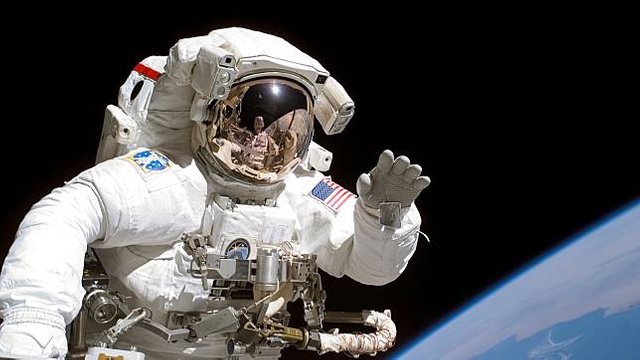What Happens to NASA's Astronauts When US 'Shutdown'?

Since Saturday (20/1) the US government officially applied 'Goverment Shutdown' until the time limit that has not been determined.
This shutdown state coincides with a year President Donald Trump leads. This condition occurs due to not obtaining the state operational budget agreement for the next year.
No budget can be disbursed means no money for operations. That is, government work can not run.
As a result of this condition, at least 10 sectors of US government services are now halted. The ten sectors are the US Taxation Agency, health services, the Law Department, the Department of Foreign Affairs, the Department of Defense, the Intelligence Service, the Department of Homeland Security, the Ministry of Home Affairs, the Department of Transportation and the Department of Environmental Protection.
Then what about the conditions of the NASA astronauts, the US space agency, currently in the Space Station (ISS)?
Quoted from The Atlantic, some vital US service sectors will continue to work even though the administration is now in shutdown. Some of the US employees who continue to work are among others NASA astronauts who are at the ISS, namely Mark Vande Hei, Joseph Acaba, and Scott Tingle.
In addition, mission control staff, regarded as "important" personnel, will also continue to work to support the astronauts, so part of the US on the ISS will remain in operation forever as long as there are NASA astronauts there.
However, NASA can not stop doing the work to ensure that humans in the micro-gravity space above 320 kilometers from Earth are alive.
"To protect the life of the crew and its assets, we will continue to support the ISS operations plan during the termination of funds," NASA said in a written plan published in November 2017, which outlines the protocol of government shutdown.
To support the lives of astronauts at the ISS, NASA will also continue the launch and delivery activities of the necessary space devices to prevent harm to life and property on the ISS.
This means, NASA will continue to work on the James Webb Space Telescope that for several months has been undergoing testing at Johnson Space Center in Houston. This telescope is scheduled to be launched in the spring of 2019.
Satellite missions that are in orbit and operating will also continue. However, jobs on satellite missions that have not been launched will be suspended first.
For staff stationed on Earth, NASA headquarters advises directors at NASA's research centers over who should be employed and who should stay at home.
Employees in both categories were hired and asked to wait patiently for their salaries to fall until Congress approved the state's operational budget.
If the shutdown continues, the number of staff employees at NASA's research facilities will shrink dramatically.
According to the charts included in NASA's shutdown plan, based on employment levels in 2015, the number of staff at Goddard Space Flight Center in Maryland will be reduced by 3,223 to 334. Approximately 193 employees will remain there in a call in case of an emergency.
The number of employees in all agency facilities will shrink dramatically. According to a table included in NASA's shutdown plan, based on the employment level of 2015, the labor force at Goddard Space Flight Center in Maryland, the largest facility of agency with staff size, the workforce will be reduced from 3,223 to 334. About 193 employees will remain called in case emergency events.
As at Johnson Space Center, the number of staff will shrink from 3,057 to 173, with 400 people ready on call.
Under conditions of shutdown, NASA's research centers and research facilities close to the public and its agencies suspended their use of websites, streaming services, and online operations.
That means, if this shutdown continues until next week, spacewalk plans (actions astronauts run in space) outside the ISS is scheduled to be done on next Tuesday will not be broadcast on television.